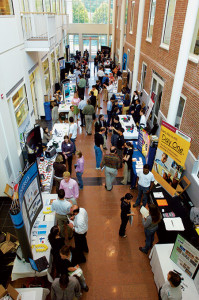
At center is an image of the 2015 Career Fair at the Thayer School of Engineering, flanked by the logos of some of the companies on the fair’s growing list of participants. The fair is just one component of the maturing structure of tech recruiting at Dartmouth
As we go through our studies at college, the world is entering an age of innovation. Graduating from Dartmouth, we expect to become the driving forces behind new and exciting ventures as we enter the real world. Right now, that means tech. As the industry grows, the need for bright, young talent is quickly increasing. Accordingly, Dartmouth has seen a major influx of student interest in the computer science and engineering fields. Campus recruiting serves the confluence of employer needs and student interest, and the College must determine how to best use this system to respond to the booming tech industry.
Dartmouth’s recruiting system, run mainly through the Center for Professional Development (CPD), has been widely seen as one that best promotes finance and consulting, as opposed to technology. In 2015, 51% of graduates went into these fields, compared to a 12%, who went into tech. To students, the difference in focus is notable. A ’16 computer science major, Jake Gaba, admitted he didn’t apply to many firms directly through Dartmouth’s programs, such as Dartboard. The better resource for students interested in technology, he said, is the Thayer Career Services’ recruiting program, ThayerLink. Technology companies generally recruit students from there, instead of through the CPD, he said. Thayer hosts an engineering career fair, at the Thayer School, and a virtual career fair over skype every year.
Still, Jake said, the best way to get interviews at desired companies is by talking to Dartmouth alumni. Alumni get a bonus from their companies if the person they refer is hired, so reaching out to them will likely be fruitful. Another senior and computer science major, Naho Kitade, has also taken routes outside of Dartmouth to pursue interviews. Kitade says she found that the best strategy was to send out resumes to a large collection of companies and to see where she was successful.
She conceded that Dartmouth has done a better job with tech recruiting in recent years, as interested students had lamented not having as many opportunities on campus as they would like. One challenge she cited was Dartmouth’s location and size. With a relatively small number of students interested in programming (75 CS majors are graduating this year), companies from Silicon Valley hesitate to make the trip to Hanover. Senior Associate Director at the CPD, Monica Wilson, says the school has been actively working to bring more companies to campus. Top companies that now recruit at Dartmouth through Thayer include Google, Microsoft, IBM, and SAP SE. Students have applauded the College for bringing more startup companies to campus, as well.
Dartmouth is still exploring more ways to improve the recruiting system. One exciting development is the piloting of a new network called Dartmouth Circles. Circles promotes nontraditional employer-student conversations, with companies like Microsoft, Nexus, Apian, and SAP included. Companies who are looking to hire students outside of the recruiting process will talk with students who have created a profile on Circles and are seeking more information. As the network develops, more interviews will hopefully be facilitated this way. Wilson added that Dartboard has no shortage of tech companies on its registrar and that alumni networks are always available to students.
Dartmouth also faces the challenge, however, of having relatively few resources to prepare the growing number of students interested in the tech industry to acquire the skills they need to excel, especially when applying to the same positions as students from technology-focused schools. Kitade said that, as the interest in CS is growing exponentially at Dartmouth, the College is struggling to keep up. Computer Science 1 now generally has 400 students enrolled in each term. “The school hasn’t been able to catch up to the demand,” she said. A broader curriculum, more professors, more classes, and a bigger building, are all necessary for the department to properly account for students wanting to commit to computer science.
However, as a liberal arts college, Dartmouth often provides certain advantages to students entering the tech industry. Although Gaba said that personality doesn’t play as big a role in tech as it does in industries like finance and consulting, Kitade asserted that the typical outgoing nature of Dartmouth students is an asset for tech companies. “Liberal arts, especially at Dartmouth, where you do have to be more social and active on campus— [tech recruiters] like that because they obviously need people who can communicate, and who can be active, and who can take leadership when you need to, and who can work on a team,” she explained. The technology industry is extremely collaborative and team-oriented, and Dartmouth’s social vibrancy and discussion-based curriculum give our graduates an end.
As the College works to improve both its computer science department and its recruiting operation, students passionate about pursuing tech and engineering have the opportunity to help shape the future of Dartmouth’s standing in the technology industry. The College’s resources are for students’ benefit, and so should reflect what students want. For those interested in being a part of the innovation that is shaping our world today, striving to innovate Dartmouth’s technology opportunities is a good place to start.

Be the first to comment on "Tech Recruiting Takes Shape at Thayer"